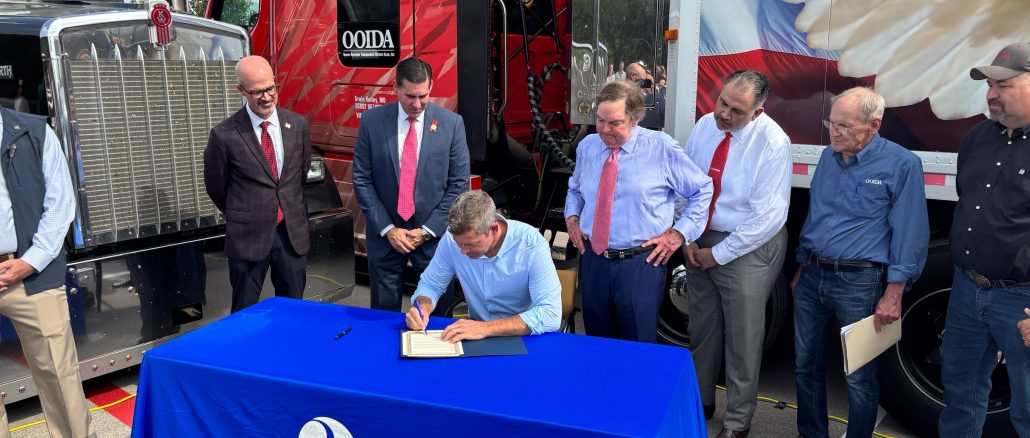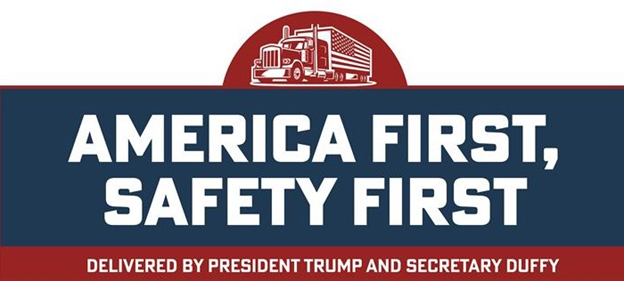
By GTM Staff, with reporting from Reuters
August 22, 2025
WASHINGTON — Reuters reported on Thursday that the United States has halted the issuance of new worker visas for commercial truck drivers. Further, the Department of Transportation had launched a sweeping review of state licensing practices following a deadly Florida highway crash that officials say exposed dangerous lapses in enforcement of federal safety rules.
Secretary of State Marco Rubio announced Thursday that the government is “immediately pausing” visas for foreign truckers, citing both highway safety risks and concerns about American jobs.
“The increasing number of foreign drivers operating large tractor-trailer trucks on U.S. roads is endangering American lives and undercutting the livelihoods of American truckers,” Rubio wrote on X.
The announcement followed the arrest of Harjinder Singh, an Indian national who prosecutors allege caused a three-fatality crash on Interstate 95 in Florida earlier this month. Singh, who authorities say lacked legal authorization to be in the U.S. and did not speak English, allegedly attempted an illegal U-turn through a restricted median access point, blocking traffic and leading to a collision with a minivan that killed three occupants. He has been charged with three counts of vehicular homicide and was extradited from California to Florida to face trial.
Federal Investigation Launched
Transportation Secretary Sean P. Duffy said the Federal Motor Carrier Safety Administration (FMCSA) opened a compliance investigation into Singh’s employer, White Hawk Carriers, Inc., and into the states that issued him licenses.
According to preliminary FMCSA findings, Washington State issued Singh a full-term commercial driver’s license in 2023 despite his ineligibility, while California granted him a limited-term CDL in 2024. New Mexico State Police stopped Singh for speeding in July 2025 but did not administer the required English language assessment.
FMCSA investigators later tested Singh, who answered only 2 of 12 verbal questions correctly and could identify just one of four road signs.
“If states had followed the rules, this driver would never have been behind the wheel and three precious lives would still be with us,” Duffy said in a press release. “This crash was a preventable tragedy directly caused by reckless decisions and compounded by despicable failures.”
Crackdown on English Proficiency
The Trump administration has moved aggressively in recent months to enforce an English-language requirement for commercial drivers, a rule that has been on the books for decades but inconsistently applied.
In April, President Trump signed an executive order requiring inspectors to place drivers out of service if they cannot demonstrate English proficiency. The move reversed 2016 Obama-era guidance that prohibited inspectors from sidelining drivers solely for failing an English test.
Duffy followed with additional steps. In May, he issued new federal guidance reinforcing the English requirement. In June, he unveiled a broader “Pro-Trucker Package” aimed at raising pay, improving rest conditions, and enhancing safety for U.S. drivers. Later that month, he announced a nationwide audit of state CDL programs to ensure compliance with federal licensing standards.
Those initiatives, detailed by the Department of Transportation (guidance enforcement order, pro-trucker package, licensing audit), are now being put to the test in the aftermath of the Florida crash.
Industry Reaction
The administration’s pause on visas drew immediate support from the American Trucking Associations (ATA), the industry’s largest trade group.
In a statement issued Thursday, ATA President & CEO Chris Spear said the policy is overdue.
“ATA supports pausing work visas for commercial drivers and believes the issuance of non-domiciled CDLs needs serious scrutiny, including the enforcement of entry-level driver training standards. At a minimum, we need better accounting of how many non-domiciled CDLs are being issued, which is why we applaud Transportation Secretary Duffy for launching a nationwide audit in June upon our request,” Spear said.
“We also believe a surge in enforcement of key regulations — including motor carrier compliance — is necessary to prevent bad actors from operating on our nation’s highways, and we’ll continue to partner with federal and state authorities to identify where those gaps in enforcement exist.”
Balancing Safety and Workforce Needs
Industry groups are watching closely. The trucking sector employs more than 3.5 million drivers nationwide, and about 16% were born outside the United States, according to FMCSA data cited by Reuters. Many fleets, struggling with a chronic driver shortage, have turned to immigrant labor to fill long-haul routes.
Some Mexican drivers near the U.S. border have even begun studying English to comply with the new requirements, Reuters reported last month. But critics say the administration’s visa freeze could worsen supply chain pressures if companies cannot find qualified replacements quickly.
At the same time, unions and independent drivers have welcomed the tougher stance. “This levels the playing field,” said one Midwestern driver reached by phone. “We can’t compete if companies are cutting corners with unqualified drivers who don’t even meet the basics of the law.”

Next Steps
The FMCSA’s compliance investigation into White Hawk Carriers remains ongoing. Federal officials said they will share findings with Florida prosecutors as Singh’s criminal case moves forward. The Department of Transportation has also pledged to hold states accountable for failures in issuing or monitoring CDLs.
“America First means safety first,” Duffy said. “We will use every tool at our disposal to hold states and bad actors accountable and restore safety to our roads.”
For families mourning the crash victims, those words may offer little comfort. But for U.S. regulators, the tragedy has become the catalyst for a sweeping crackdown on how truckers are trained, tested, and licensed to drive America’s heaviest rigs.